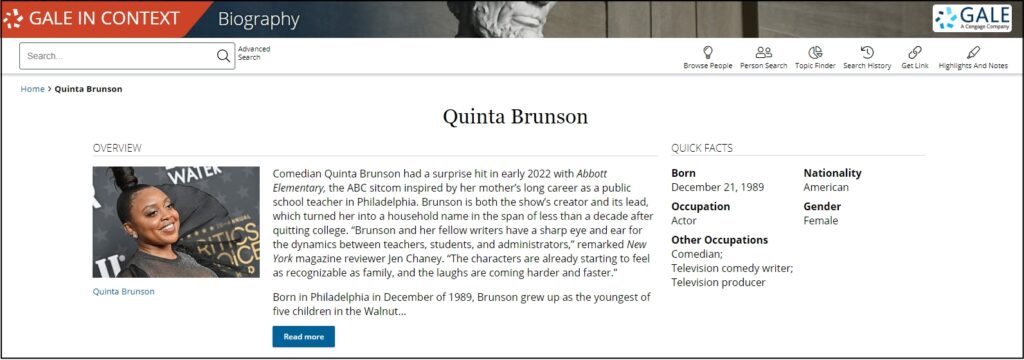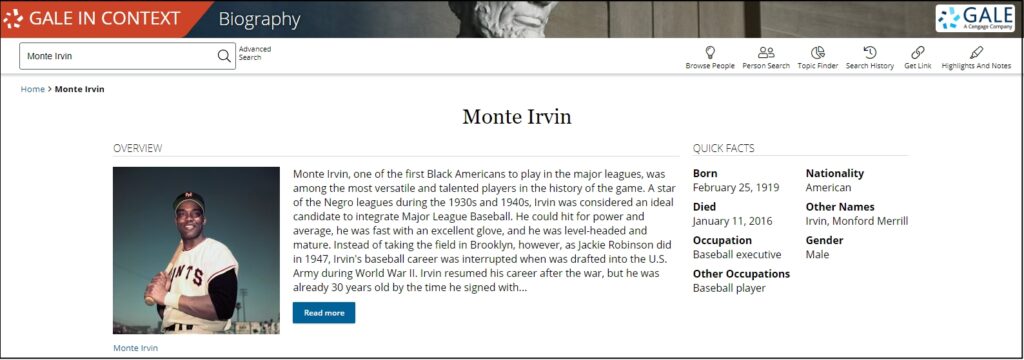| By Carol Brennan |
Each February, we’re awed at how long a list of achievers and icons we compile from the vast and frequently updated archives of Gale In Context: Biography in honor of Black History Month. We hope you agree after joining us here on a short but thought-provoking gallery tour of both recent honorees and long-overdue additions.
Quinta Brunson (born 1989), of television’s Abbott Elementary fame, ended a shockingly long 42-year gap in January 2024 when she became the first Black woman to win an Emmy Award for Outstanding Lead Actress in a Comedy Series since the legendary Isabel Sanford (1917–2004) was honored in 1981 for her iconic portrayal of Louise “Weezy” Jefferson in the long-running CBS sitcom The Jeffersons. Sanford was a Broadway veteran but had first come to wider acclaim in 1967 for her supporting role in Guess Who’s Coming to Dinner, a social-issues film that was said to have been inspired by the interracial marriage of a British socialite to a Ghanaian politician. That couple’s son is philosopher Kwame Anthony Appiah (born 1954), who writes the popular weekly column “The Ethicist” for the New York Times.
On the musical front, two illustrious Black folk singers have been recently highlighted: Tracy Chapman (born 1964) performed at the 2024 Grammy Awards with Luke Combs, whose 2023 cover of Chapman’s iconic 1989 hit “Fast Car” made her the first Black woman to win the Song of the Year Award from the Country Music Association. The other notable is Elizabeth Cotten (ca. 1895–1987), an American songwriter and guitarist whose World War I–era tune, “Freight Train,” is a classic in the folk genre and was recently heard on the soundtrack of the film Asteroid City.
Since it isn’t technically Black Women’s History Month—although that would be thrilling if it existed!—we’ll have to head over to the sports category to reveal the true range of names in Gale In Context: Biography. Last year we added young Damar Hamlin (born 1998), the Buffalo Bills safety whose collapse on the field was witnessed by millions of television viewers of the National Football League’s Monday Night Football in January 2023. The Pennsylvania-born Hamlin grew up a Pittsburgh Steelers fan, the NFL franchise that made history in 1974 as the first team to start a Black quarterback, Joe Gilliam Jr. (1950–2000), in a season opener—which the Steelers won in a 30-0 shutout against Baltimore. Two Major League Baseball luminaries have also been featured in Gale In Context: Biography. They are New York Yankees power hitter Aaron Judge (born 1992) and trailblazer Monte Irvin (1919–2016), who made the transition from the segregated-leagues era to bring the New York Giants to a thrilling “Subway Series” World Series against the New York Yankees in 1951.
Finally, we’d like to end with a spotlight on two remarkable names in the social-justice and Black American history categories. The first is Bronx-born Tarana Burke (born 1973), whose work as a young woman with victims of sexual assault inspired her to create the Me Too movement in 2006, which required more than a decade as well as the gasoline of the social-media platform age to start some important and necessary fires. Our entry on Burke for Contemporary Black Biography cites one of her early influences, a 1962 book written by longtime Ebony magazine editor and Black history scholar Lerone Bennett Jr. (1928–2018), Before the Mayflower: A History of Black America, 1619–1962. Fittingly, Bennett was appointed to the advisory board when the U.S. federal government authorized the creation of the National Museum of African American History and Culture in Washington, DC.
You can read more about these people and others in Gale In Context: Biography.

About the Author
Carol Brennan has been writing biographical entries for Cengage/Gale since 1993. If she’s not writing, she is either at yoga or walking her dachshund. Carol consumes an alarming volume of podcasts and audiobooks weekly.




